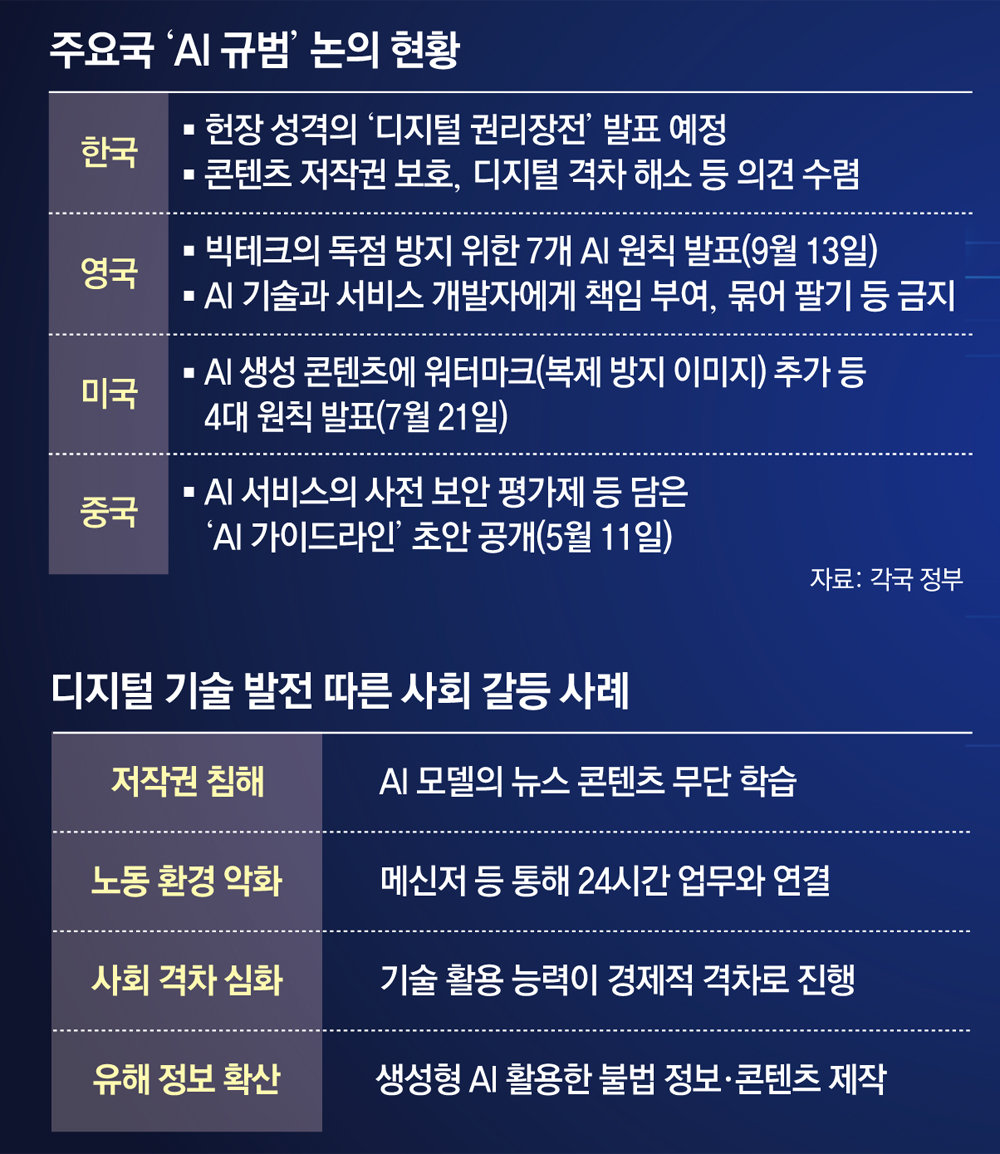U.S. “Insert anti-copy images into content”
UK targets US Big Tech: “Ban technology monopolies”
President Yonhap also announced the ‘Digital Bill of Rights’
Taking the lead in full-scale discussions on AI standards
Major countries around the world are competing to announce norms for how to use digital technologies, including artificial intelligence (AI), and user behavior patterns. President Yoon Seok-yeol also announced the five basic principles of the ‘Digital Bill of Rights’ at New York University on the 21st, including that everyone should have fair access to digital. In a situation where technologies such as AI are shaking up existing value systems such as copyrights and labor environments, countries are engaging in a ‘competition for normative hegemony’ to reflect their countries’ positions more in global standards.
Park Yun-gyu, Second Vice Minister of Science and ICT, said in an interview with the Dong-A Ilbo on the 22nd, “The country that establishes new norms first will be the winner in the era of digital deepening,” and “Korea will lead the global discussion.” The Digital Bill of Rights announced by President Yoon is a type of charter that contains basic social norms for utilizing cutting-edge technologies such as AI. The Ministry of Science and ICT plans to announce the full contents of the Bill of Rights soon.
Previously, on the 18th, the UK’s Competition and Markets Authority (CMA) announced the ‘7 AI Principles’ targeting American Big Tech (large high-tech companies) such as Google, Microsoft (MS), and Meta (formerly Facebook). The key is to ensure that the company that developed the AI model is responsible for any problems that arise during the service process and to prevent them from monopolizing technology and data. The British government plans to hold an ‘AI Summit’ in November and invite leaders of major countries and CEOs of big tech. It is reported that the European Union (EU), with Commission President Ursula von der Leyen attending this meeting, will respond favorably to the UK’s move to establish AI standards.
The fact that Korea, the UK, and the EU are rushing to establish standards is a strategy to take the lead before the UN or the Organization for Economic Co-operation and Development (OECD) begin discussing AI norms in earnest. The United Nations decided to form an advisory committee with external technology experts to discuss AI-related norms and regulations and announce them before September next year. The OECD also plans to hold a ‘Digital Rights Council’ in November to discuss a new digital order, including AI. In this process, it is highly likely that the United States, which has powerful AI technology, and the United Kingdom and EU, which oppose it, will voice different voices. China, which is nurturing companies while maintaining thorough security, is also a variable. Lee Jae-yeol, a professor of sociology at Seoul National University, said, “The United States, Europe, and China are engaged in a huge competition for (AI norms) hegemony behind the scenes,” and added, “Korea also needs to respond quickly.”
The Ministry of Science and ICT is holding on-site meetings to hear the opinions of numerous professors, industry experts, and users to prepare a bill of rights. One of the most mentioned topics in the process was ‘digital gap’. Vice Minister Park emphasized, “A young person I met at the field meeting was worried that each individual’s digital skills could lead to a larger economic gap,” adding, “This is an important issue that must be taken care of through the new norms.” Changes in the working environment due to the advancement of digital technologies such as AI were also an important topic mentioned during the discussion of the Bill of Rights. This means that the Bill of Rights should include provisions to prevent the side effects of losing jobs or increasing labor intensity due to the development of digital technology. The Ministry of Science and ICT also plans to promote technology research and development (R&D) to resolve side effects such as hallucination, where the AI model gives plausible answers to incorrect information. The ‘Next Generation Generative AI Technology Development’ project, which will invest 22 billion won from next year to 2027, has passed the preliminary feasibility study.
Source: Donga
Mark Jones is a world traveler and journalist for News Rebeat. With a curious mind and a love of adventure, Mark brings a unique perspective to the latest global events and provides in-depth and thought-provoking coverage of the world at large.
